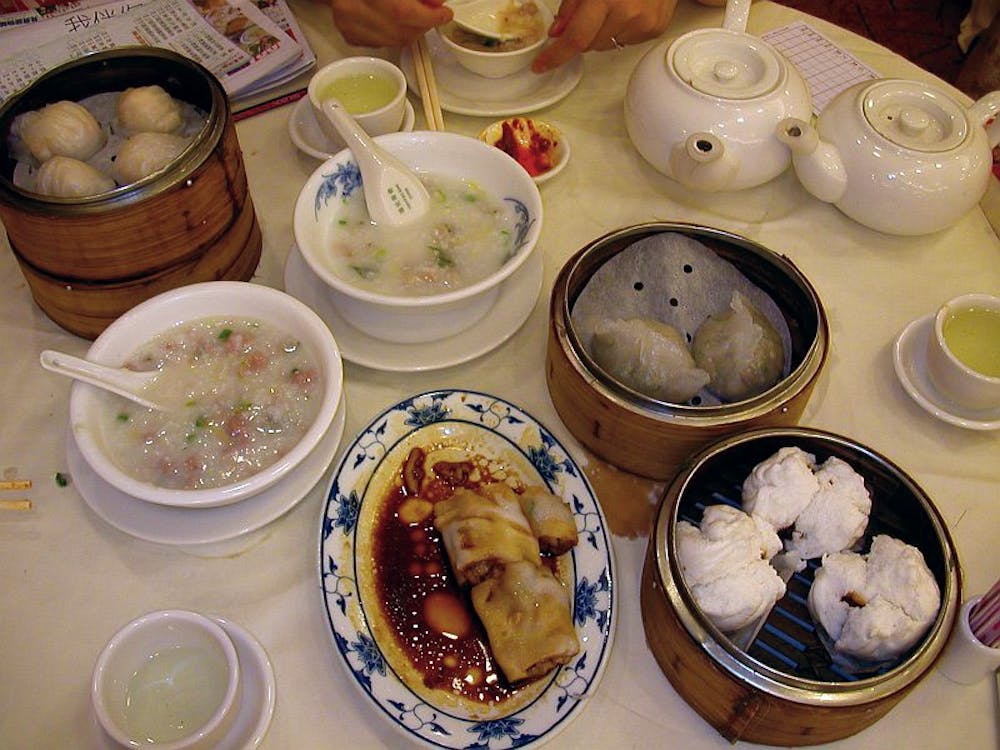Mandarin: 你吃饭了吗?
Cantonese: sik6 zo2 faan6 mei6 aa3 ?
“Have you eaten yet?” It’s a common greeting among the older Chinese generation from times when food was not so abundant, as a way to both say hello and ask, “how are you?”
I first realized not too long ago that almost every time I speak to my grandmother on the phone, this is the first question that she asks me. It’s funny how much my family talks about food: my mom or dad will often call just to ask what I’m eating, what I’ve been cooking. They’ll tell what they’ve recently tried to cook or send pictures of new foods they’ve tried.
It’s no secret that I really, really like food. I grew up in a restaurant family and ‘helped’ my parents prepare sauces before I could count to 10, learned the ins and outs of the kitchen before I graduated 5th grade, and started waiting tables in middle school. I’ve always been surrounded by food, and feel at home in a busy kitchen during dinner rush.
This love for food runs in my family, but I’ve been thinking a bit more about why food means so much to me, and why people feel so strongly about it.
Food is clearly something that matters a lot to people—I quickly surveyed my friends about their favorite foods they ate at home and got: fried chicken, egg and tomato, patacones de Colombia, homemade noodles, gumbo, zha jiang mian, 红烧肉, Vietnamese spring rolls, guiso de carne, Kare-kare, congee, kimbap. Y’all clearly love food.
It’s mundane, it’s constant, it’s sometimes boring. It’s there when we share heated arguments over Thanksgiving turkey, or chatter over hot pot in the freezing winter, or kick back over barbecue (Kansas City has the best, feel free to prove me wrong).
But food has so much meaning because it oftentimes carries a story.
During the Cultural Revolution in China, my grandfather spent years in a labor camp where food was hard to come by and family visitations were allowed only every once in a blue moon. When a visit was allowed, my grandmother would cook up some hard-to-come-by flour with sugar and send it with my five-year old mother, making her promise not to eat any and to save it for my grandpa. Upon receiving the treat, my grandpa would share it with my mother anyways.
Years later, my aunt as a young girl would be sent to live in the rural villages as part of Mao Zedong’s Up the Mountains Down the Countryside Campaign. My grandmother would cook food especially spicy to fend off potential thieves in the hopes that her daughter could eat more.
Whenever my grandpa would hear that somebody was visiting from the village my aunt was in, he would rush home to roll up his sleeves, knead some dough, and steam some 饅頭 buns to send for her to eat.
I think about how these are the very same buns that they made for me when I was growing up, and I can’t help but feel guilty for ever wasting a bite. My grandma still loves sharing recipes with me, and when I ask, every recipe comes with a different story.
The cha siu bao I love is the same my mother discovered in Hong Kong. The curry I cook is the same my grandmother learned from her childhood in Myanmar. The cheung fun I enjoy is the same my father cooked finding his way in Kansas City. The Hakka food I dream of while cramming for midterms is the same my ancestors shared in China. (Sometimes I wonder where my love for cheap pizza, Capri-Sun, and cosmic brownies fits into this).
Food brings back memories and comforts, and for that reason we choose to share. It’s a way to connect to their culture and their home. When my friend’s mother makes us Brazilian feijoada, or our family friend gives us a sack of homemade tamales, I know it means something special to them.
But because of the bond between our foods and our cultures, food also acts as a means for our agency and self-expression.
Food history offers an understanding of what we eat in a broader context of migration patterns and cultural exchanges. These dynamics matter, and help explain why some cuisines are seen as cheap and destined for take-out and others are expensive and seem to belong on white tablecloths.
Because it’s such important part of people’s culture, identity and agency, it does matter. It’s why people would feel so upset to see their cultures misrepresented, misconstrued, exploited or disrespected by somebody else.
So when someone chooses to share their home food with you, appreciate it for what it might mean to them.
Many Asian parents don’t always say “I love you,” or “I miss you,” or “I wish that I could see you.” But when my family asks if I’ve eaten today, I know what it means.
Get The Chronicle straight to your inbox
Sign up for our weekly newsletter. Cancel at any time.
At Duke, it can be hard sometimes to find the time and space to take care of yourself in the most basic ways. The academic, social and professional pressure cooker of stress that is college tends to make you forget about, or intentionally forgo your sleep, mental health and diet.
So whatever your favorite foods are, whatever brings you comfort and makes you feel healthy. Whether it's rice and beans, Sunday gravy on pasta, fried chicken, sesame noodles, tamales, curry or schnitzel for all I care:
Find some time and call up your momma for the recipe. (And share it with me, too.)
Lance Tran is a Trinity senior. His column runs on alternate Tuesdays.

